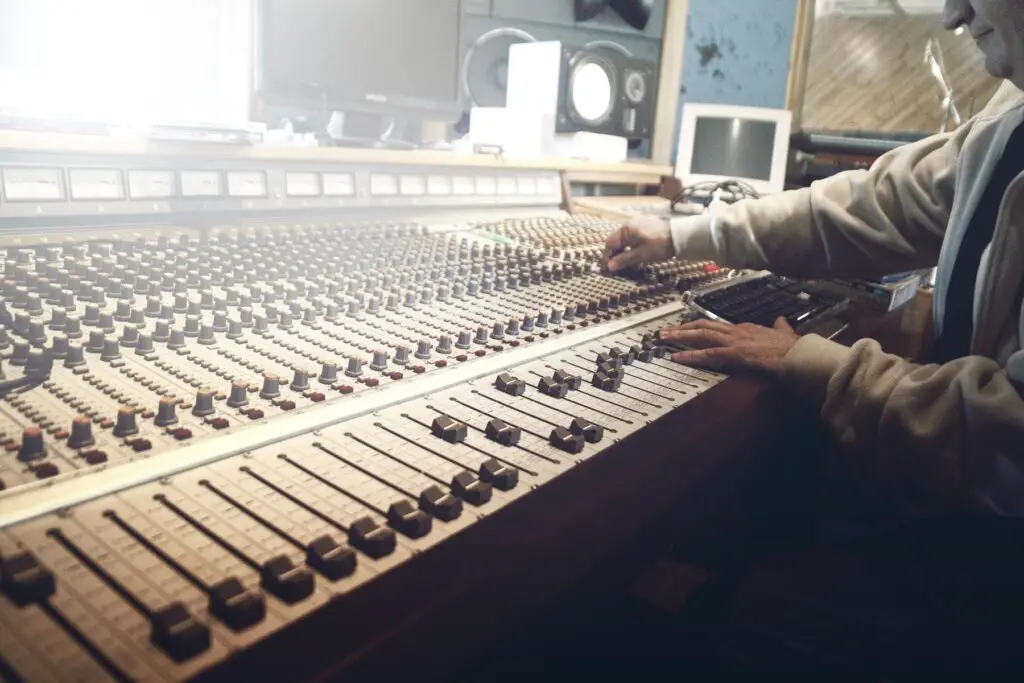Music production and audio engineering are two critical components of the music industry. Both professions require unique skill sets and knowledge to bring an artist’s vision to life. However, there is often confusion around the differences between music production and audio engineering and which path is the right fit for aspiring music professionals. In this article, we will explore the key differences between music production vs audio engineering, discuss the skills and knowledge required for each, and provide insights on how to choose the right path for your career in the music industry.
Table of Contents

Introduction
In the music industry, there are two important roles that are crucial to the creation of music: music production and audio engineering. Understanding the difference between these two roles is essential for anyone who wants to pursue a career in the industry.
Definition of Music Production and Audio Engineering
Music production is the process of creating music from the initial idea to the final mix. It involves working with musicians, songwriters, and other creative professionals to develop a song or album. Music producers are responsible for overseeing the entire process, from selecting songs to arranging and recording them, to mixing and mastering the final product.
Audio engineering, on the other hand, is the technical side of music production. It involves using recording equipment, microphones, and software to capture and manipulate sound. Audio engineers are responsible for making sure that the sound is clear, balanced, and free of any unwanted noise or distortion.
Importance of Understanding the Differences
While music production and audio engineering are both important parts of the music industry, they require very different skills and knowledge. Understanding the differences between these two roles is crucial for anyone who wants to pursue a career in music production or audio engineering. It will help you determine which role is best suited to your strengths and interests, and help you make informed decisions about your education and career.
As you move forward in your career, you may find that your interests and skills change. Understanding the differences between music production and audio engineering can help you make informed decisions about your career path and the types of jobs that you pursue. By understanding the unique skills and knowledge required for each role, you can set yourself up for success and achieve your goals in the music industry.

Music Production
Music production is a multifaceted process that involves numerous stages. At its heart, music production is about creating a song or album that sounds great and resonates with listeners. To achieve this, music producers must possess a profound understanding of music theory, songwriting, and production techniques.
Essential Skills and Knowledge for Music Production
Becoming a successful music producer requires a broad range of skills and knowledge. Some of the key skills include:
-
Music Theory: A strong understanding of music theory, including chord progressions, scales, and harmonies, is essential to music production.
-
Songwriting: The ability to write compelling lyrics and melodies that resonate with your audience is a crucial skill for music producers.
-
Production Techniques: Music producers must be able to use recording equipment, software, and other tools to create high-quality recordings.
-
Communication Skills: Effective communication with musicians, songwriters, and other creative professionals is vital to the success of a music producer.
Music Production Techniques and Tools
Music producers use a variety of techniques and tools to create high-quality recordings. Some examples include:
Digital Audio Workstations (DAWs)
DAWs are software programs that enable you to record, edit, and mix music. Some popular DAWs are:
-
Ableton Live: A versatile DAW favored by electronic music producers and performers.
-
Logic Pro X: A powerful DAW that is popular among Mac users.
-
Pro Tools: A professional-grade DAW widely used in the music industry.
Virtual Instruments
Virtual instruments are software versions of real instruments that you can use to create realistic-sounding recordings. Some popular virtual instruments include:
-
Native Instruments Kontakt: A software sampler that includes a wide variety of high-quality sounds and instruments.
-
Spectrasonics Omnisphere: A powerful synthesizer that includes a vast library of sounds and textures.
-
Arturia V Collection: A collection of virtual instruments that includes emulations of classic synthesizers and keyboards.
MIDI Controllers
MIDI controllers are devices that allow you to control virtual instruments and other software using physical buttons and knobs. Some popular MIDI controllers include:
-
Novation Launchpad: A grid-based controller that is popular among electronic music producers.
-
Akai MPK Mini: A compact MIDI controller that is ideal for on-the-go music production.
-
Native Instruments Komplete Kontrol: A MIDI keyboard that is designed to work seamlessly with Native Instruments software.
Effects Processors
Effects processors are devices that enable you to add reverb, delay, and other effects to your recordings. Some popular effects processors include:
-
Universal Audio Apollo Twin: A high-end audio interface that includes built-in effects processing.
-
Waves Plugins: A collection of software plugins that includes a wide range of effects and processors.
-
Eventide H9: A versatile effects processor that includes a wide range of classic and modern effects.
The Role of a Music Producer in the Music Production Process
Music producers are responsible for overseeing the entire music production process, from selecting songs to arranging and recording them, to mixing and mastering the final product. They work closely with musicians, songwriters, and other creative professionals to ensure that the final product is of the highest quality. Effective communication and project management skills are essential to ensuring a successful music production process.

Audio Engineering
Audio engineering is an essential part of the music production process. It involves using recording equipment, microphones, and software to capture and manipulate sound. Audio engineers are responsible for ensuring that the sound is clear, balanced, and free of any unwanted noise or distortion.
Skills and Knowledge Required for Audio Engineering
To become a successful audio engineer, you need to have a deep understanding of recording technology and techniques. Some of the key skills and knowledge required for audio engineering are:
-
Knowledge of Recording Equipment: You need to understand how microphones, mixers, and other recording equipment work and how to set them up correctly.
-
Acoustics: You need to know how sound waves behave in different environments, and how to create the best possible recording environment by adjusting the room acoustics.
-
Signal Flow: You need to understand how audio signals travel through recording equipment and software and how to optimize the signal flow for the best possible sound quality.
-
Software Proficiency: You need to be proficient in using digital audio workstations (DAWs) like Pro Tools, Logic Pro, and Ableton Live, as well as other software tools for audio editing and mixing.
Audio Engineering Techniques and Tools
Audio engineers use a variety of techniques and tools to capture and manipulate sound. Here are some examples:
-
Microphones: Microphones are devices that capture sound waves and convert them into electrical signals. Some popular microphones for audio recording include Shure SM57/SM58, AKG C414, and Neumann U87.
-
Mixers: Mixers are devices that allow you to control the levels and balance of different audio signals. Some popular mixers include Yamaha MG10XU, Behringer X32, and SSL G-Series.
-
Equalizers: Equalizers are devices that allow you to adjust the frequency balance of audio signals. Some popular equalizers include Waves SSL E-Channel, API 550A, and FabFilter Pro-Q 3.
-
Compressors: Compressors are devices that reduce the dynamic range of audio signals, making them more consistent in volume. Some popular compressors include Universal Audio LA-2A, Waves CLA-2A, and Empirical Labs Distressor.
The Role of an Audio Engineer in the Music Production Process
Audio engineers are responsible for capturing and manipulating sound in a way that enhances the final product. They work closely with music producers to ensure that the sound is clear, balanced, and free of any unwanted noise or distortion. A good audio engineer must have great attention to detail and be able to work under pressure to meet tight deadlines. They must also have excellent communication and interpersonal skills to work effectively with artists, producers, and other studio professionals.
Comparison: Music Production vs Audio Engineering
Music production and audio engineering are both vital components of the music industry, but they require different skill sets and knowledge. While music production focuses on the creative process of creating a song or album that resonates with the audience, audio engineering is all about capturing and manipulating sound in a way that enhances the final product.
Differences Between Music Production and Audio Engineering
Music production involves composing, arranging, recording, and producing music using various techniques and tools. Music producers are responsible for overseeing the entire music production process and bringing the artist’s vision to life. This involves working with musicians, selecting the right equipment and software, and ensuring that the final mix and master is of high quality.
Audio engineering, on the other hand, focuses on capturing and manipulating sound using various techniques and tools. Audio engineers work with microphones, mixing consoles, software, and other equipment to record and mix sound for music, film, television, and other media. They are responsible for ensuring that the sound quality is clear, balanced, and consistent.
Similarities Between Music Production and Audio Engineering
While music production and audio engineering require different skills and knowledge, there are some similarities between the two roles. Both roles require a strong understanding of music theory, composition, and arrangement. They also require technical skills in using various software and hardware tools, as well as good communication and collaboration skills.
Importance of Understanding the Differences
Understanding the differences between music production and audio engineering is crucial when choosing a career path in the music industry. It can help you determine which role is best suited to your strengths and interests, and guide you in making informed decisions about your education and career.
Examples of Scenarios Where One Role Might Be More Appropriate Than the Other
There are many scenarios where one role might be more appropriate than the other. For example, if you are interested in the creative side of music production, you might be better suited to a career as a music producer. If you are more interested in the technical side of music production, you might be better suited to a career as an audio engineer. It is important to consider your strengths, interests, and preferred working environment when choosing between these two careers.
Insider Tip: Regardless of which career path you choose, it is important to continually develop your skills and knowledge through education and hands-on experience. Consider taking courses, attending workshops, and collaborating with other professionals to expand your skills and build your portfolio.
Career Paths in the Music Industry
The music industry offers a variety of career paths beyond music production and audio engineering. Here are some other career paths to consider:
Music Education
Music education involves teaching music to students of all ages and skill levels. This can include working in public or private schools, teaching music lessons, or leading choirs and orchestras. To pursue a career in music education, a degree in music education or a related field, as well as teaching certification may be required.
Music Therapy
Music therapy involves using music to help individuals improve their mental, emotional, and physical health. Music therapists work with people of all ages and backgrounds, including individuals with developmental disabilities, mental health disorders, and chronic illnesses. To become a music therapist, a degree in music therapy and certification from the Certification Board for Music Therapists is typically required.
Music Business
Music business involves working in the business side of the music industry, such as marketing, promotions, and artist management. This can include working for record labels, music publishing companies, and artist management firms. A degree in music business or a related field, as well as experience in marketing, promotions, or artist management may be required to pursue a career in music business.
Tips for Choosing the Right Career Path in the Music Industry
When choosing a career path in the music industry, it’s important to consider your interests, skills, and education. Research different career paths and talk to professionals in the field to get a better understanding of what each role entails. Consider internships or job shadowing opportunities to gain hands-on experience in different areas of the music industry. It’s also important to stay up-to-date with industry trends and technology, as the music industry is constantly evolving.

Future Developments in Music Production and Audio Engineering
The music industry is constantly evolving with new technologies and trends emerging all the time. In this section, we will discuss some of the most exciting developments in music production and audio engineering and their potential impact on the music industry.
Virtual Reality (VR) and Augmented Reality (AR) Music Production
Virtual reality (VR) and augmented reality (AR) technology are making waves in the music industry as they provide a new, innovative way to create immersive music experiences. With VR, musicians can create virtual stages and performances, and fans can attend concerts from the comfort of their homes. AR technology, on the other hand, can be used to enhance live performances by overlaying digital content on top of the real-world environment.
Artificial Intelligence (AI) in Music Production
Artificial Intelligence (AI) is changing the way music is produced. AI algorithms can assist with tasks such as songwriting, mixing, and mastering, by providing suggestions and automating repetitive tasks. With AI, musicians can create music faster and more efficiently, while maintaining high-quality standards.
Mobile Music Production
Mobile music production is becoming increasingly popular as smartphones and tablets continue to advance in technology. With mobile devices, musicians can create music on-the-go, record ideas, and collaborate with other musicians from anywhere in the world. Mobile music production apps, such as GarageBand and FL Studio Mobile, are now available, which provide musicians with the tools and features needed to create professional-sounding tracks.
Impact of Emerging Technologies and Trends on the Music Industry
The impact of emerging technologies and trends in music production and audio engineering is significant. VR and AR music experiences could lead to new forms of live performance and immersive listening experiences, while AI in music production could democratize music creation, allowing more people to create high-quality music without extensive training. Mobile music production, on the other hand, could make music creation more accessible and convenient.
Tips for Staying Up-to-Date with Emerging Technologies and Trends in Music Production and Audio Engineering
To stay up-to-date with emerging technologies and trends in music production and audio engineering, it’s important to read industry publications, attend conferences and workshops, and network with other professionals in the field. Experimenting with new technologies and tools is also crucial to gain hands-on experience and stay ahead of the curve.

Choosing the Right Path
When considering a career in the music industry, it’s important to choose the right path that aligns with your interests, skills, and education. Here are some factors to consider when choosing between music production and audio engineering:
Your Interests
Music production and audio engineering require different skill sets and offer different career paths. If you enjoy the creative side of music, songwriting, and arranging, music production might be the best fit for you. On the other hand, if you enjoy the technical aspects of audio recording, mixing, and mastering, audio engineering might be a better option.
Your Skills
Your skills and background will also play a role in determining which path to take. If you have a strong background in music theory, songwriting, and composition, music production might be a natural fit. However, if you’re more technically inclined and have a knack for working with audio equipment and software, audio engineering might be a better fit.
Your Education
Both music production and audio engineering require some level of education or training. Consider what kind of education or training you need to pursue a career in either field. Some options include attending music school or university, taking online courses or workshops, or pursuing an apprenticeship or mentorship with a professional in the industry.
Different Career Paths
There are many different career paths available in the music industry beyond just music production and audio engineering. Some other options include music education, music therapy, or music business. Take some time to research different career paths and determine which one aligns best with your interests and skills.
Tips for Getting Started
If you’re interested in pursuing a career in music production or audio engineering, there are many different resources available to help you get started. Some of the best resources include:
-
Online courses and tutorials: There are many online courses and tutorials available that can teach you the skills and knowledge you need to succeed in music production or audio engineering.
-
Music production software: There are many different types of music production software available, from free tools like Audacity to professional-grade software like Pro Tools.
-
Audio engineering courses: There are many different audio engineering courses available, both online and in-person. Look for courses that offer hands-on experience and a strong curriculum.
By taking the time to consider your interests, skills, education, and career goals, you can find the path that is right for you in the music industry.
Conclusion
To sum up, music production and audio engineering play a vital role in the music industry. It is essential to distinguish between these two roles, as they require different skills and knowledge. Having a clear understanding of the differences between them can help you decide which career path to follow, depending on your interests, skills, and education. However, it is also important to note that the two roles can complement each other, and many professionals in the music industry often have experience in both areas.
To further your knowledge in the music industry, check out our other content on music production software, audio engineering courses, and other related topics. With the right resources and dedication, you can succeed in pursuing a career in music production or audio engineering.


